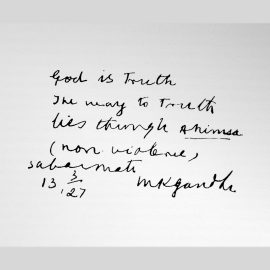

This article gives you a glimpse of what you can learn with Shortform. Shortform has the world’s best guides to 1000+ nonfiction books, plus other resources to help you accelerate your learning.
Want to learn faster and get smarter? Sign up for a free trial here .
Does life have a meaning? How does one find meaning in a universe that’s meaningless by design?
Many people feel like life has no inherent meaning, which gives rise to feelings of apathy and existential angst. This sentiment grows increasingly common as people adopt a more secular worldview where science—not God—prevails.
In this article, we’ll discuss several views on how to live a meaningful life, no matter your religious orientation or lack thereof.
The Growing Need for Meaning
Most humans crave order and meaning in their existence, to deal with the terrifying uncertainty of the world. For much of history, this function was served by religion.
However, people in the developed world are moving to greater secularism, as a result of scientific explanations of the world’s uncertainty, critical thinking around religion and the logical impracticality of all religions being true at once, and moral relativism.
But take away religion, and a void remains. In the absence of meaning conferred by the belief in the supernatural, people are prone to nihilism, anxiety, and misery.
TITLE: 12 Rules for Life
AUTHOR: Jordan Peterson
TIME: 31
READS: 78
IMG_URL: https://www.shortform.com/blog/wp-content/uploads/2019/09/12rules_cover.jpg
BOOK_SUMMARYURL: 12-rules-for-life-summary-jordan-peterson
AMZN_ID: B01FPGY5T0
How to Live With More Meaning
In Man’s Search for Meaning, Victor Frankl says that we can’t ask the question this way, as though there was one universal answer that should be satisfying to all of us. We can’t generalize what life is. The tasks of life, and consequently the meaning of life, differs for every individual—no two people experience the same life.
Trying to ask it generally would be like trying to ask a chessmaster what’s the best chess move in the world. Any chessmaster would tell you that it depends on the particular game and the situation in that particular game—there’s no one way to win a chess game, and it depends on your choices and how your opponent reacts to them.
The meaning of life differs from person to person. More than that, every situation in your own life is unique and different from the last situation you encountered, and may require different decisions on your part to shape your fate. So we have to ask this question specific to ourselves at this specific moment: “what is the meaning of my life right now?”
Of course, when we ask “what’s the meaning of life” or “what is the meaning of my life right now,” we want an answer. But life can’t answer you. Life asks you what its meaning is, and you have to answer.
With this in mind, let’s explore some perspectives on how to live a meaningful life.
TITLE: Man's Search for Meaning
AUTHOR: Viktor E. Frankl
TIME: 17
READS: 37.5
IMG_URL: https://www.shortform.com/blog/wp-content/uploads/2020/01/manssearch_cover.jpg
BOOK_SUMMARYURL: mans-search-for-meaning-summary-viktor-frankl
AMZN_ID: B009U9S6FI
Do What You Love
In Ikigai: The Japanese Secret to a Long and Happy Life, Héctor García and Francesc Miralles teach you to apply the Japanese concept of ikigai to help you figure out how to live a meaningful life.
The word ikigai is essentially the Japanese equivalent of the French raison d’être, meaning a person’s reason for existing, or life purpose. According to the Japanese, each of us has a different ikigai. Your ikigai could center on an art or craft, a sport, your job, or any number of things. Furthermore, you don’t necessarily have just a single ikigai. Einstein, for example, had two: physics and playing the violin. He said that if he hadn’t been a physicist, he would have devoted his life to music.
Your own ikigai is hidden deep within, so you have to search for it. However, the Japanese say you shouldn’t become preoccupied with finding it. Instead, let your ikigai find you as you occupy yourself with doing what you love in the company of people who love and care for you.
TITLE: Ikigai
AUTHOR: Héctor García and Francesc Miralles
TIME: 23
READS: 148.4
IMG_URL: https://www.shortform.com/blog/wp-content/uploads/2021/05/ikigai-cover.png
BOOK_SUMMARYURL: ikigai-summary-héctor-garcía-and-francesc-miralles
AMZN_ID: XYZ
Get Your Priorities in Order
According to Bill Burnett and Dave Evans, the authors of Designing Your Life, you find meaning by living coherently. It’s easy to find meaning in what you do and feel good about the direction of your life when your priorities and behaviors are aligned. On the other hand, when your actions and goals don’t reflect what’s important to you, your life is incoherent—your behaviors reflect different priorities, which creates internal conflict and hinders your ability to feel good about what you’re doing.
For example, you believe spending time with your family is important. If you unintentionally neglect them in favor of working 60-hour weeks, then you’ll experience incoherence and will feel unhappy. However, if you’re consciously working long hours now as part of a plan to spend more time with them in the long run, then you will feel satisfied—even if the behavior itself feels unpleasant, you’ll feel good about it because it’s coherent with your priorities.
| How to Live a Meaningful Life: Give Up the Need for External Validation In Think Like a Monk, Jay Shetty offers additional insights to explain why you might have unclear priorities. He defines priorities as the values or core beliefs you choose to live by—they determine who you want to be and how you treat yourself and others. However, many people, due to a need for external validation, allow others to determine their priorities. This creates unclear values and dissatisfaction (incoherency): When you’re preoccupied with pleasing others to gain positive feedback, you’re distracted from thinking about how you feel, what your unique needs are, and what makes you happy. As a result, you end up engaging in activities and behaviors that don’t feel meaningful to you. This leads to a life that feels incoherent, and you’ll be susceptible to negative thoughts and distractions. Releasing your need for external validation creates clear values and satisfaction (coherency): Switching your focus from what others want to what you want allows you to define and live in alignment with your values. As a result, you engage in activities that feel meaningful—your behaviors and your priorities are coherent. This makes you less prone to negative thinking and feelings of dissatisfaction. |
TITLE: Think Like a Monk
AUTHOR: Jay Shetty
TIME: 15
READS: 65
IMG_URL: https://www.shortform.com/blog/wp-content/uploads/2021/09/think-like-a-monk-cover.png
BOOK_SUMMARYURL: think-like-a-monk-summary-jay-shetty
AMZN_ID: XYZ
Express Yourself
German philosopher Friedrich Nietzsche, the author of the philosophy classic Thus Spoke Zarathustra, argues that you find meaning by identifying and pursuing your personal virtues: your innate strengths and passions—even if other people try to label your passions as vices.
Nietzsche cautions that suppressing your passions leads to lust and hypocrisy, which are bad: If you have an innate passion for something, but you call it a vice and try to abstain from it, then you’ll be lustful because you desire something that you think is wrong. And sooner or later, your lust will get the better of you and you’ll end up doing what you’ve said is wrong, which is hypocrisy.
On this note, it’s important to point out the ethical implications of this assertion because what you find meaningful may be socially unacceptable or even immoral. According to Nietzsche, however, what’s good for someone else may not be good for you and vice versa. He denounces any objective distinction between good and evil as a concept that humans invented for the purpose of controlling others, usually in ways that promote conformity and thereby hinder progress.
For example, suppose someone is fascinated with stealing. If she cultivates this passion and becomes an expert thief, her children might become even better thieves because of what they learn from her and inherit genetically. So stealing would become an increasingly refined trait for natural selection to either favor or weed out. But if she suppresses her inclination to steal for fear of criminal punishment, that won’t happen, and natural selection will be less effective because the population will be more uniform.
Contemplate Death
Death makes life precious and meaningful. It changes your perspective and priorities. It makes you more bold and loving. Someone who’s truly spiritually awake doesn’t change anything about how they’ve been living when death arrives, because they’ve already been living fully in the bliss of nonresistance and unconditional happiness.
But you don’t have to wait until you’re at your deathbed to feel that your life is meaningful. All you need to do is to get into the habit of contemplating death every now and then. Buddhists contemplate the temporal nature of all things. Yogis meditate in graveyards. Take inspiration and guidance from such people.
TITLE: The Untethered Soul
AUTHOR: Michael A. Singer
TIME: 31
READS: 101.3
IMG_URL: https://www.shortform.com/blog/wp-content/uploads/2021/05/the-untethered-soul-cover.png
BOOK_SUMMARYURL: the-untethered-soul-summary-michael-a-singer
AMZN_ID: XYZ
Final Words
With the rise of secularism, the question of the meaning of life grows increasingly relevant. If you’re ready to give it some serious thought, check out the following suggestions for further reading.
The Last Lecture by Randy Pausch, a computer science professor at Carnegie Mellon University, is a distillation of his life experiences and lessons on how to live a meaningful life. Written with reporter Jeffrey Zaslow, the best-selling book is an expanded version of a “Last Lecture” Pausch gave in 2007, after being diagnosed with pancreatic cancer.
The “Last Lecture” series was a tradition in which professors presented their philosophy of life, as if it were their last chance to share what was important to them. It truly was a last chance for Pausch, who had only months to live. His book and lecture, which went viral and has been viewed by millions, are about living your dreams.
Author Jordan Peterson argues that modern secularism and reliance on science has left a void in answers to important existential questions: What is the point of living? Why do bad things happen to good people? What am I supposed to do to make myself happier? 12 Rules for Life addresses these questions and gives a set of lessons on how to live a meaningful life in the context of rising secularism.
In The Daily Stoic, Ryan Holiday and translator Stephen Hanselman share insights from the ancient philosophers on how to live a meaningful life from a stoic perspective. It was a bestseller in 2016 and has since been expanded into a thriving podcast and website.

Want to fast-track your learning? With Shortform, you’ll gain insights you won't find anywhere else .
Here's what you’ll get when you sign up for Shortform :
- Complicated ideas explained in simple and concise ways
- Smart analysis that connects what you’re reading to other key concepts
- Writing with zero fluff because we know how important your time is






